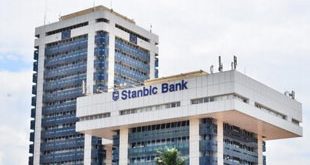
❇ Money paid in benefits up by 25% from sh360 billion to sh450 billion
❇ 17% growth in contributions collections from sh1.049 trillion to sh1.208 trillion
❇ Assets under Management up by 13.1% from sh9.98 trillion to sh11.3 trillion
Kampala, Uganda | THE INDEPENDENT | National Social Security Fund (NSSF) members should expect a reduction in the interest rate this year compared to last year, on account of a drop in NSSF’s total income compared to the previous year.
“Given our performance this year, the fund will not match the interest rate paid the previous Financial Year 2017/2018. As we await the declaration by the Minister of Finance, Planning & Economic Development next week,” said NSSF Managing Director Richard Byarugaba in a press briefing in Kampala on Tuesday September 17, 2019.
NSSF last year declared a record interest payout of 15 per cent on members’ savings for the financial year 2017/2018. The Annual Members’ Meeting is scheduled for 27th September 2019.
At yesterday’s press briefing, Byarugaba had more bad news for members, revealing that that NSSF had lost sh402 billion due to exposure in the regional equity market, especially the Nairobi stock exchange.
Byarugaba however said NSSF’s finances and investments are on the right track, saying he believed the setbacks are due to temporary slump in the market.
“Although 2018/19 was a very difficult year for the Fund; We still managed to grow the Fund by over 13.6%. We have created value for the members – we will keep our promise to pay 2 percentage points above the 10 year rate of inflation,” Byarugaba reassured members.
“There was actually a 17% growth in contributions collections from sh1.049 trillion to Sh1.208 trillion. The Fund can withstand any shock in the economy, given our aggressive but prudent investment approach and our investment diversification strategy. ‘Safety’ and ‘Security’ of members’ funds will remain the guiding principle in our decision making.”
He said NSSF is optimistic because the East African economies are projected to grow by an average of 6%, driven by infrastructure spend, improved agricultural output and the growth of the oil and gas sector.
The National Social Security Fund (NSSF) is National Saving Scheme mandated by Government through the National Social Security Fund Act, Cap 222 (Laws of Uganda) to provide social security services to employees in Uganda. Government is pushing for an amendment in parliament to enable NSSF enter new areas and adjust to the changing times.
Breakdown of NSSF performance in past year
❇ The amount of money paid in benefits increased by 25% from Ugx 360 billion in 2017/2018 to Ugx 450 billion in 2018/19. The Average Benefits Turn-Around-Time 2018/19 remained flat at 8 days.
❇ There was a 17% growth in contributions collections from Ugx 1.049 trillion to Ugx 1.208 trillion. The growth in contributions was driven by growth in the economy which increased the new members registered
❇ Assets under Management increased by 13.1% from Ugx 9.98 trillion to Ugx 11.3 trillion at 30th June 2019. The growth was mainly driven by increased contributions and interest income
❇ 20.4% growth was in realized income, growing from Ugx 1.04 trillion in 2017/2018 to Ugx 1.25 trillion in 2018/2019 due to increased gross Interest income from Treasury and Infrastructure bonds
❇ Interest rate remained relatively stable in FY 2018/19. However, long-term bond yields dropped with the 15-year moving from 17.75% at the start of the year to 15.85% as at the end of June 2019 This was significant for the Fund, given that we hold over 70% of our total investment portfolio in long term bonds.
❇ During the year, the East African stock markets suffered significant losses in value. The NSE lost 14%, the USE lost 10% in Uganda and Tanzania plummeted by 21%
❇ Share prices closed below the prices registered in at end of the previous Financial Year, which impacted our equity portfolio
❇ Cost of Administration improved slightly from 1.31% in 2017/2018 to 1.28% in 2018/2019 with the cost income ratio remained flat at 11.6%
❇ Customer satisfaction slightly dipped by 1% from 85% in 2017/2018 to 84% in 2018/2019 while staff engagement increased from 84% in 2017/2018 to 88% in 2018/2019
 The Independent Uganda: You get the Truth we Pay the Price
The Independent Uganda: You get the Truth we Pay the Price



Am not happy with NSSF performance
Definately the largest corporate financial loss in the history of Uganda.